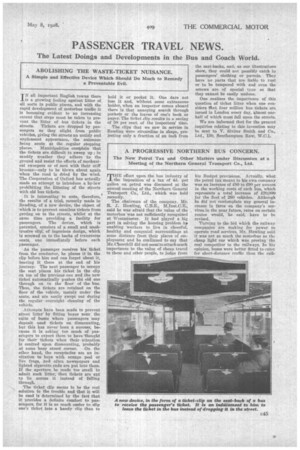PASSENGER TRAVEL NEWS.
Page 73

If you've noticed an error in this article please click here to report it so we can fix it.
The Latest Doings and Developments in the Bus and Coach World.
ABOLISHING THE WASTE-TICKET NUISANCE.
A Simple and Effective Device Which Should Do Much to Remedy a Preventable Evil.
TN all important English towns there _Lis a growing feeling against litter of all sorts in public places, and with the rapid development of motorbus traffic it is becoming evident to an increasing extent that steps must be taken to prevent the litter of bus tickets in the streets. Tickets are dropped by passengers as they alight from public vehicles, giving the streets an untidy and unpleasant appearance, the nuisance being acute at the regular stopping places. . Municipalities complain that the tickets are difficult to sweep up ; in muddy weather they adhere to the ground and resist the efforts of mechanical sweepers or of men with their stiff brooms—only to be blown about again when the road is dried by the wind. The Corporation of Oxford has actually made an attempt to introduce a by-law prohibiting the littering of the streets with old bus tickets.
It is interesting to note, therefore,` the results of a trial, recently made in Reading, of a new device, the object of which is to prevent omnibus tickets from getting on to the streets, whilst at the same time providing a facility for passengers. The device, which is patented, consists of a small and unobtrusive clip, of ingenious design, which is screwed on to the backs of transverse seats, one immediately before each passenger.
As the passenger receives his ticket from the conductor, he places it in the clip before him and can forget about it, leaving it there at the end of his journey. The next passenger to occupy the seat places his ticket in the clip on top of the previous one and the new ticket automatically pushes the old one through on to the floor of the bus. Thus, the tickets are retained on the floor of the vehicle, mainly under the seats, and are easily swept out during the regular overnight cleaning of the vehicle.
Attempts have been made to prevent street litter by fitting boxes near the exits of buses where passengers may deposit used tickets on dismounting, but this has never been a success, because it is asking too much of passengers to expect them to have thought for their tickets when their attention• is centred upon dismounting, probably at some busy street corner. On the other hand, the receptacles are an invitation to boys with orange peel or live frogs, and often newspapers and lighted cigarette ends are put into them. If the aperture be made too small to admit such litter, then tickets are apt to lie across it instead of falling through.
The ticket clip seems to be the real solution to the trouble and that it will be used is determined by the fact that it provides a definite comfort to passengers, for it is so much easier to slip one's ticket into a handy clip than to held it or pocket it. One dare not lose it and, without some extraneous holder, when an inspector comes aboard there is that annoying search through pockets or the leaves of one's book or paper. The ticket clip results in a saving of 50 per cent, of the inspectors' time.
The clips that we saw in service in Reading were streamline in shape, projecting only a fraction of an inch from the seat-backs, and, as our illustrations show, they could not possibly catch in passengers' clothing• or parcels. They have no parts that are liable to rust or to be tampered with and even the screws are of special type so that they cannot be easily undone.
One realizes the importance of this question of ticket litter when one considers that four million bus tickets are issued in London every day, almost onehalf of which must fall upon the streets.
We are informed that for the present inquiries relating to this invention may be sent to V. Siviter Smith and Co., Ltd., 150, Southampton Row, W.1J.1.
























































































































